We have so many people who send us emails to ask us “is my Great Dane too skinny”, that we thought it was time for a blog post! This is a common question.
Great Danes are a lean and athletic breed, though people expect them to be heavy and stocky.
I thought it would be helpful to share some photos of dogs that are emaciated, thin, and overweight so that you can make real-life comparisons about whether or not your Great Dane is too skinny.
Always, always consult your veterinarian if you are unsure either way. Dogs can gain and lose weight quickly and may have underlying health problems, including parasites and diabetes.
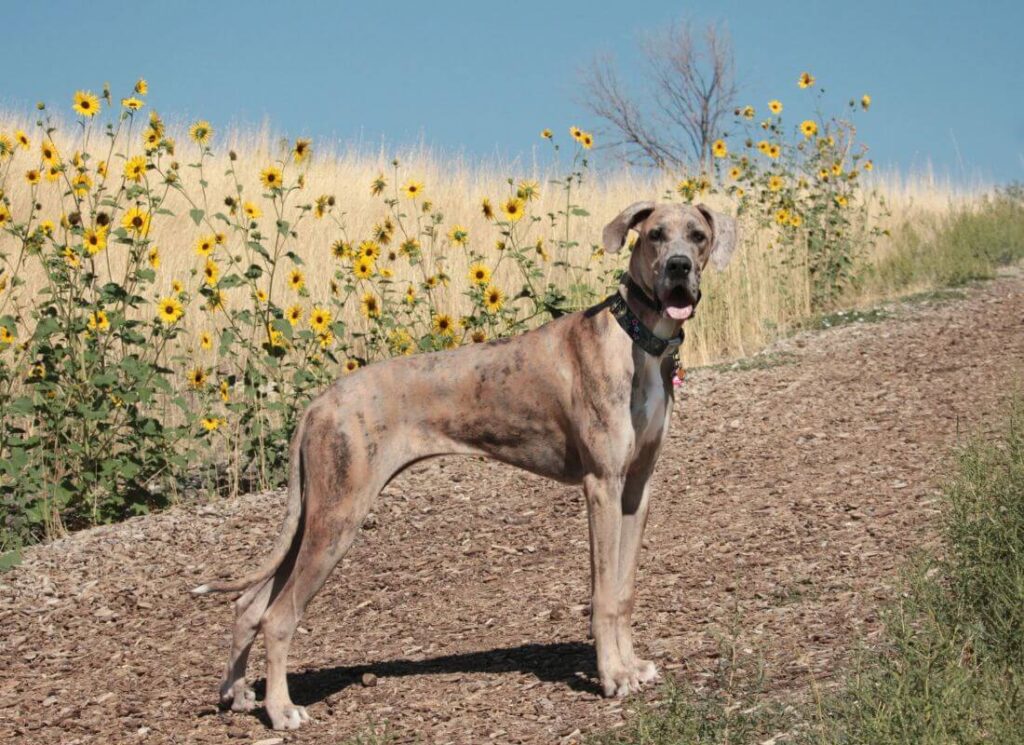
What do Healthy Weight Great Danes Look Like?
The following images are of Great Danes that are at a healthy weight. Click on any image to view larger and in full.
Notice the defined waist, tuck in the abdomen, muscle, and even the presence of a rib or two. These dogs all appear to be offered plenty of free exploration time on varied terrain (which helps develop strength in feet, hips, and abs!). They enjoy running, playing, and being active.
You may feel that some of these dogs are underweight! Unfortunately, overweight dogs skew our perception of what is healthy in Great Danes.
Chances are, if you think your dog is too skinny, you may find that your dog actually belongs in this group!
Many times, lean dogs actually need more muscle development, not more fat. Keep that in mind; if your Dane is active and moving, they will develop muscle and can fill out in a healthy and strong way. Do not overfeed your Great Dane!
Underweight Great Danes
An underweight Great Dane is malnourished. These are dogs that are either neglected, have been fed unbalanced and incorrect nutrition, or have underlying health problems (cancer, megaesophagus, parasites, etc.) that require veterinary care.
DCM (heart disease) can also cause a loss of weight and muscle.
A dog that is underweight may show the following signs: spine and/or hip bones jutting out, temples sunken in, prominent ‘knowledge bump’ on top of the head, low energy, no muscle tone, and muscle wasting.
Skinny Great Dane Puppies
Growing Dane puppies can look positively gangly at times.
An otherwise energetic and bright Great Dane puppy that is a little ‘ribby’ during a growth spurt is NOT an underweight or malnourished Great Dane.
This is normal, so long as the dog is showing signs of robust health: shiny coat, bright eyes, muscles, energy, tight feet, properly growing bones, and free of parasites, growing pains, skin conditions, and gut health issues (vomiting, loose stools, etc.).
Ethical breeding and nutrition play a key role here.
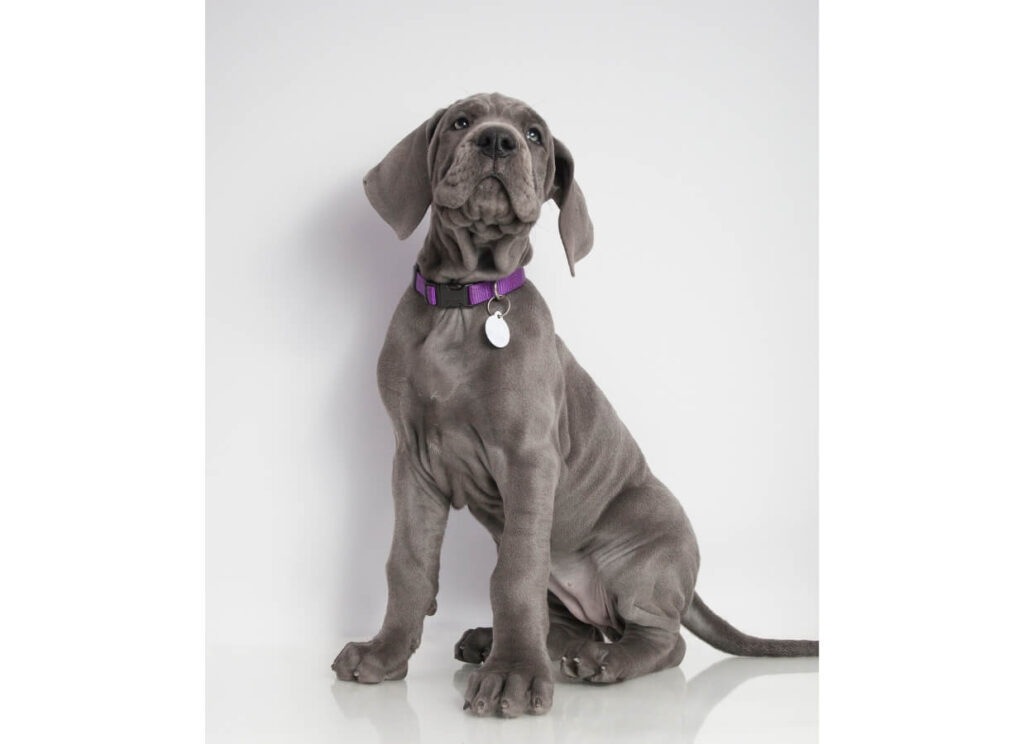
We do not recommend feeding adult food to Great Dane puppies. Adult food lacks the nutrients that they need for growth and robust muscle development; this is one reason so many Dane pups look malnourished as teenagers (because they essentially ARE).
The most up-to-date science, research, and formulations in dog food have made it safe and appropriate to feed large and giant breed puppy foods to Great Danes.
The companies that have participated in this research include Purina, Royal Canin, Hill’s Science Diet, and Eukanuba. We only recommend large and giant breed puppy foods from those brands.
I’ve linked to an article below on Great Dane puppy feeding, that will be of interest to you if you have found this article because you’re worried about your skinny Great Dane puppy!
Don’t mistake ‘filling out’ with getting fat. Filling out involves developing the breadth of the chest and hips, in addition to muscle mass. A dog that gets fat following spay/neuter around age 2 is not filling out, it’s just becoming heavy and overweight.
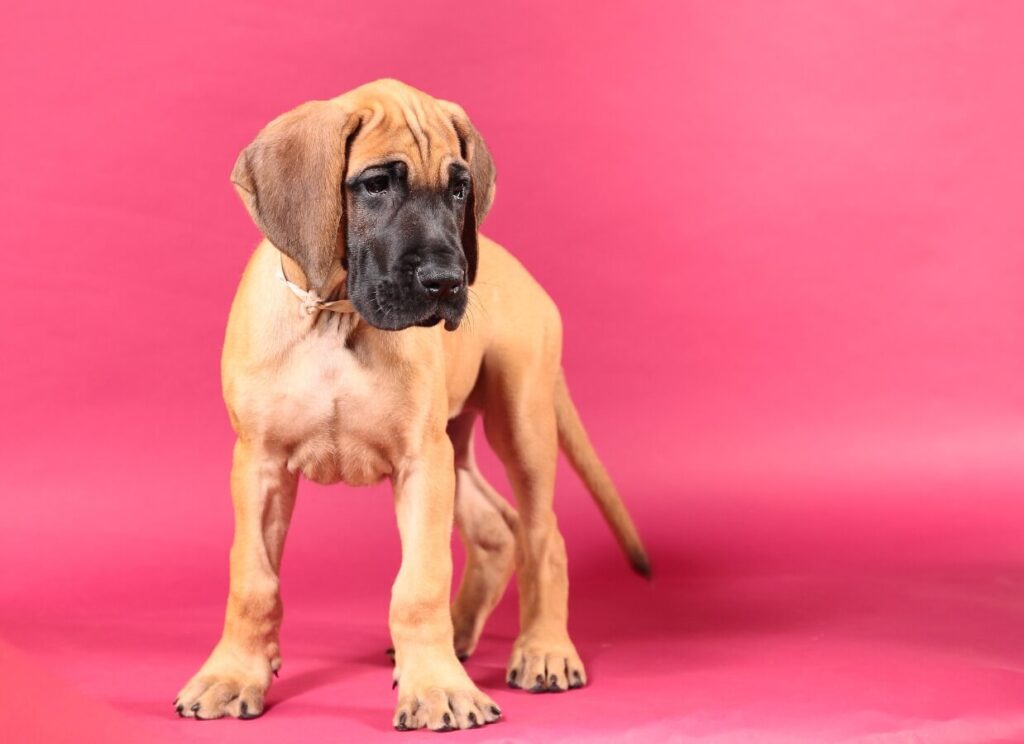
Great Dane Puppy Has Ribs Showing
If you see early signs of hips and spine showing in a previously healthy dog, chat with your veterinarian. If you are concerned about the amount of spine/ribs/hips showing your veterinarian can help you with safe ways to help your Great Dane gain weight.
The best food for a Great Dane to gain weight can be recommended to you by a professional. Do not add fatty foods, ‘Satin Balls’, or home-cooked food to fatten your dog up.
This dangerous practice can lead to health complications associated with unbalanced nutrition, not to mention pancreatitis!
Overweight Great Danes
Great Danes are a lean athletic breed. They should be graceful, robust, strong, and muscular.
Overweight dogs have shorter lives and are more likely to suffer from heart problems, cancer, arthritis, and diabetes. They are at higher risk for complications during surgical procedures and are also more prone to issues involving kidney and liver function.
Even dogs labeled as ‘Euro’ should not be heavy.
Most of the time, people are concerned that their dog is underweight. Unfortunately, being overweight is a much, much more serious health concern.
Lean is best for Great Danes.
Why Overweight Great Danes are a Problem
7 Deadly Health Risks of Obesity in Dogs
Overweight Great Danes carry excess and unnecessary weight that will affect their quality of life. Lean dogs live, on average 2 years longer than overweight dogs so if that matters to you, read on!
Many people believe that because a dog is ‘Euro’ it should look and be heavy. This is not true. Even a ‘Euro’ dog should have a defined waist. Do NOT overfeed your dog because it’s ‘Euro’ and you think it should weigh 200lbs!
Others, in pursuit of having the ‘biggest’ dog focus on the number on the scale. There is nothing to be proud of if your Great Dane is tipping the scales.
An average, healthy-weight, well-muscled, and properly structured male Great Dane may weigh quite a bit; however, a solid majority of people claiming to have 175+lb dogs actually have overweight dogs.
Extra pressure on the joints, heart, and lungs is a problem for dogs that are allowed to become heavy like this. As above, do not mistake ‘filling out’ with getting fat!
Some dogs suffer from thyroid disease and autoimmune disorders that lead to excess weight; chat with your veterinarian for help.
Because some of them are out of the standard ‘Euro’ type, people believe they should be bulkier and heavier and thus, allow and encourage them to become this way. The dogs are the ones who suffer because of this.
Body Condition Scoring in Dogs
Many veterinarians use body condition scores to assess whether a dog is at a healthy weight or not.
Your veterinarian might never really tell you that your dog is overweight! Keep in mind that your Veterinarian is first operating a business, and that includes not upsetting clients by saying things about their dog that may be perceived as judgmental.
People become very defensive and are often in disbelief. It’s a losing battle for Veterinarians. If you’ve ever wondered ‘why is my Great Dane so skinny’, you are not alone. But, we hope this information helps!
We encourage you to bring the subject up to your veterinarian, mention your concerns, and show that you are an educated owner willing to learn!
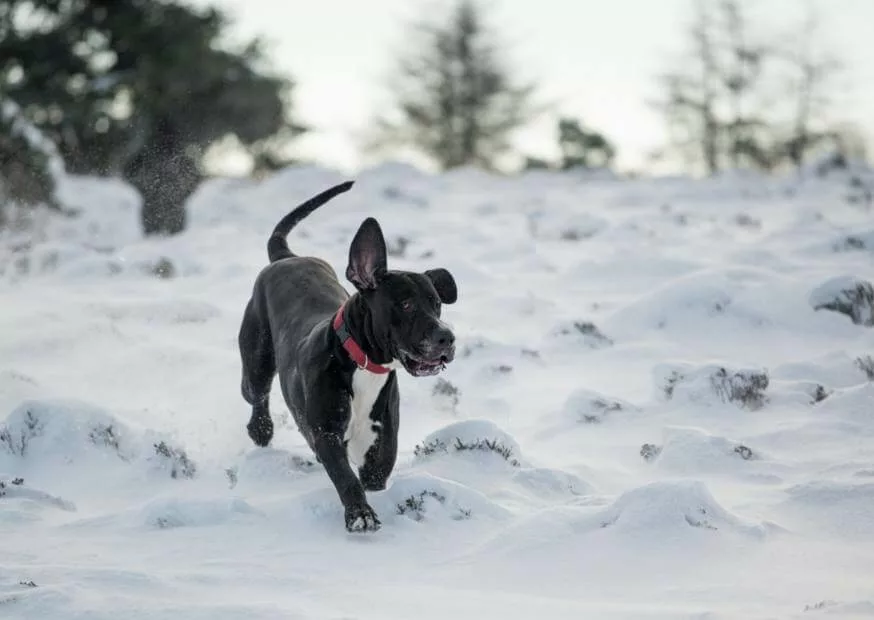
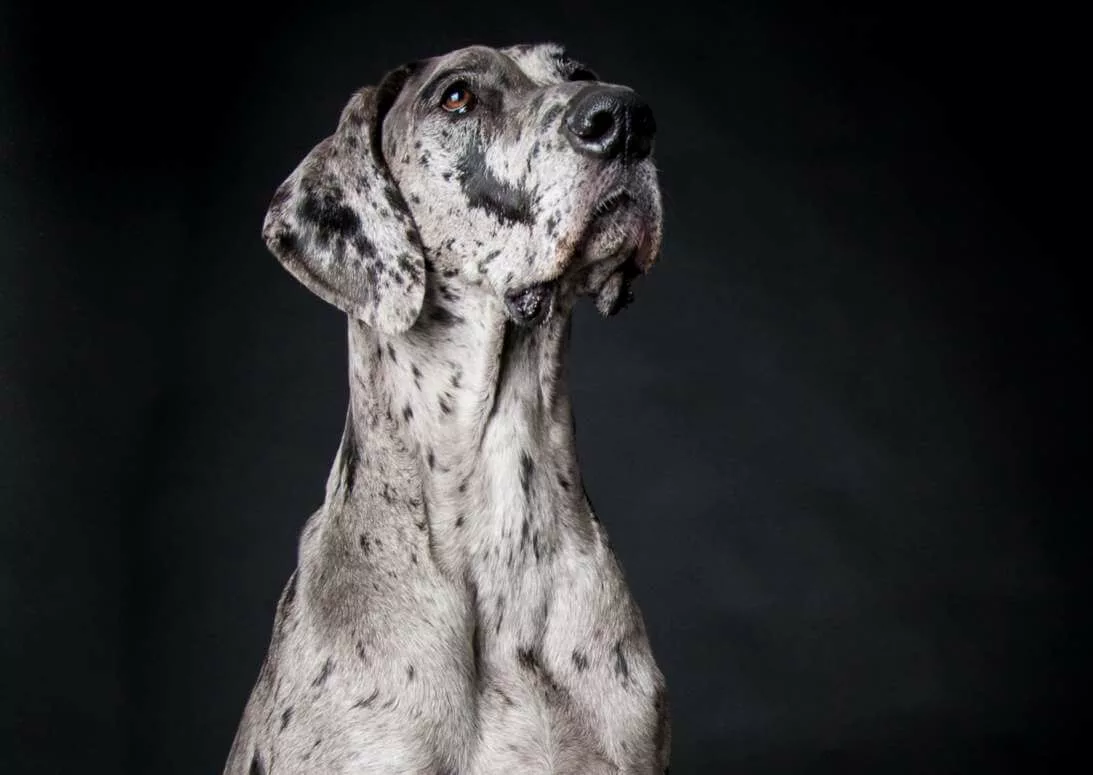
Leave a Reply